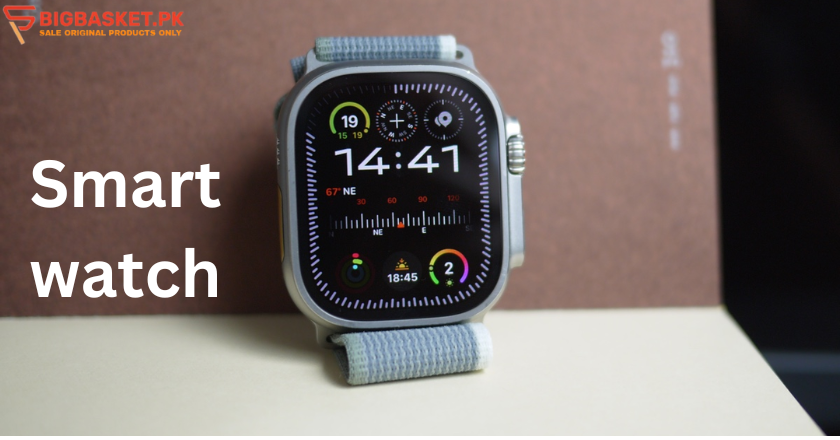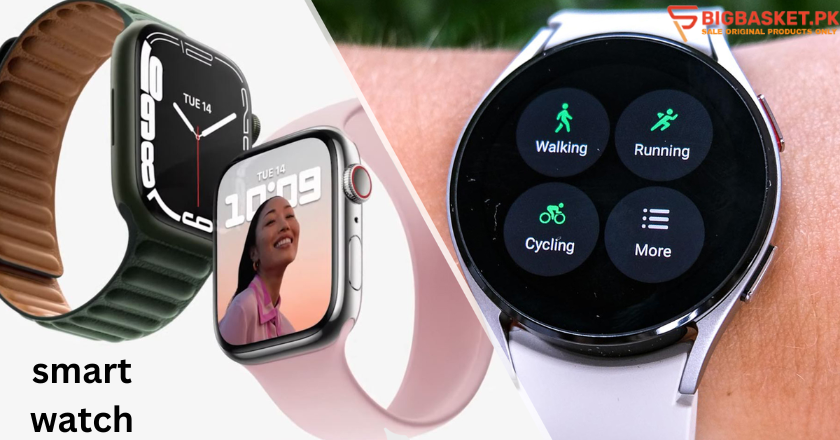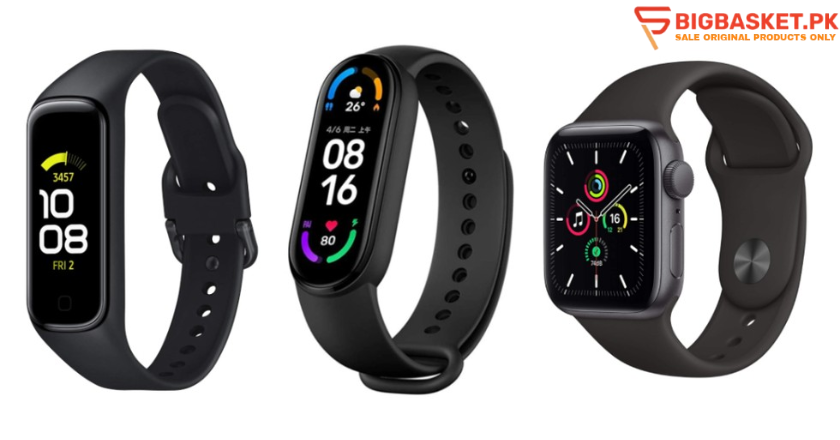smart watch

Smartwatches have become an essential accessory for modern living, seamlessly blending fashion, function, and fitness into a sleek and versatile device. With the ability to track steps, heart rate, and sleep patterns, smart watches provide unprecedented insights into our daily health and well-being. As technology continues to advance, we can expect even more innovative features from smart watches, potentially revolutionizing how we interact with our environment. Moreover, the integration of smartwatch technology with other devices such as smartphones and smart home systems further enhances their appeal. With the ability to receive notifications, make calls, or control household appliances from their wrist, users are granted a new level of convenience and efficiency that was previously unimaginable. The future of smartwatches seems poised to bring about a new era in wearable technology—a realm where style meets substance and connectivity is only a glance away.
Definition of a Smart Watch

Smartwatch: a versatile wearable device that integrates functionality found in traditional watches with modern technology. Its defining feature is the ability to connect to a smartphone, enabling access to notifications, calls, messaging, and apps directly from the wrist. Boasting features like fitness tracking, heart rate monitoring, and GPS navigation, smartwatches have become an essential tool for individuals seeking a holistic approach to health and wellness. Furthermore, as advancements continue to expand their capabilities, smartwatches are moving beyond mere accessories into true lifestyle enhancements In essence, a smartwatch is more than just a timepiece; it’s a digital companion designed to streamline daily activities and provide critical information at a glance. With its seamless integration into our interconnected lives, this innovative gadget has cemented itself as not just a trend but an indispensable part of our modern reality. As the boundaries of what constitutes ‘smart’ continue to be pushed forward with each new iteration of these wearables, it’s clear that they are here to stay—and revolutionize how we interact with technology on the go.
Growing popularity and relevance in modern lifestyles
Smartwatches have been on the rise in the modern lifestyle, evolving from mere timepieces to versatile gadgets that track fitness, receive notifications, and even make payments. As people become more health-conscious, these devices offer a convenient way to monitor physical activity and keep up with fitness goals. With the integration of advanced features like heart rate monitoring, sleep tracking, and workout guidance, smartwatches are no longer just for tech enthusiasts but have found their place in mainstream living.
Additionally, as remote work becomes increasingly common, smartwatches serve as an extension of smartphones by allowing quick access to messages and calls without constantly reaching for a phone. With productivity apps and seamless connectivity to other smart devices, smartwatches have transformed into essential tools for managing daily tasks and staying organized on the go. Furthermore, the sleek designs and customizable options make them a fashion statement rather than just a technology accessory. Smartwatches are undoubtedly becoming more relevant in modern lifestyles by blending practicality with style and efficiency in this fast-paced digital age.
Features of Smart Watches

Smart watches are more than just timepieces; they offer a wide array of features that can enhance daily life. One standout feature is the health and fitness tracking capabilities. Many smartwatches come equipped with heart rate monitors, step counters, and sleep trackers, allowing users to stay on top of their wellness goals. Additionally, some models offer GPS tracking for outdoor workouts, providing users with valuable performance data. Another appealing feature of smartwatches is their ability to handle notifications and calls without needing to reach for a phone. With the push notification feature, users can receive alerts for messages, emails, and app updates directly on their wrists. Some models also have built-in microphone and speaker capabilities for hands-free calling, making it easier to stay connected while on the go.
Health and Fitness Tracking
Health and fitness-tracking smartwatches have revolutionized the way we approach our well-being. These cutting-edge devices not only track our steps and calories burned but also monitor heart rate, sleep patterns, and even stress levels. The integration of advanced technology allows users to gain deeper insights into their overall health and make informed lifestyle choices. With the ability to sync with smartphone apps, these smart watches seamlessly centralize health data, providing a holistic approach to wellness management. Moreover, the incorporation of GPS and workout tracking features in these smart watches has empowered users to take their fitness journey to the next level. Whether it’s running, cycling, or swimming, these devices offer real-time data that enables individuals to optimize their training sessions for maximum performance enhancement. Beyond mere physical activity monitoring, some models now include mindfulness features like guided breathing exercises and meditation prompts – promoting a more comprehensive approach to overall wellness management. As such, health and fitness-tracking smart watches have become indispensable tools for individuals aiming for a more proactive role in managing their health.
Heart rate monitoring
Gone are the days of relying solely on bulky chest straps to measure heart rate during workouts. The evolution of smartwatches has brought about a revolution in heart rate monitoring, offering unprecedented convenience and accuracy. With the ability to track heart rate continuously throughout the day, these smartwatches provide a comprehensive insight into our cardiovascular health, helping us make informed decisions about our fitness routines and overall well-being. Moreover, the integration of advanced algorithms and sensors in heart rate monitoring smartwatches allows for real-time tracking of heart rate variability (HRV), providing valuable data about stress levels and recovery patterns. This not only benefits athletes seeking performance optimization but also offers potential insights into stress management and overall mental well-being for everyday users. As technology continues to advance, we can anticipate even greater personalization and precision in heart rate monitoring, empowering individuals to take proactive control of their health.
Step counting and activity tracking
Step counting and activity tracking have become an integral part of the modern approach to fitness and well-being. These tools provide us with valuable data on our daily movements, allowing us to gain insights into our activity levels and make informed decisions about our health. However, it’s essential to remember that step counting is not just about hitting a target number—it’s about cultivating a lifestyle that prioritizes movement and physical activity in all forms. As we immerse ourselves in the world of step counting and activity tracking, it’s crucial to avoid becoming solely fixated on the numbers. Instead of obsessing over hitting a specific step goal, consider focusing on overall movement throughout the day. Embracing activities like yoga or dancing can offer alternative ways to boost your overall physical activity levels without feeling constrained by step counts alone. Ultimately, these tools should serve as guides rather than rigid rules, empowering us to develop a more holistic approach to staying active and healthy.
Smart Watch

Imagine being able to track and analyze the quality of your sleep with just a glance at your wrist. Smart watches with built-in sleep analysis capabilities are revolutionizing the way we understand our rest patterns, offering insights that were previously only available in sleep labs. By monitoring factors like heart rate, movement, and even environmental noise, these devices can provide detailed reports on sleep duration, cycles, and disturbances. This level of personal data empowers users to make informed decisions about their nightly routines and overall health. Moreover, beyond mere tracking, smartwatches are now equipped with features that actively improve sleep quality. Some models offer guided breathing exercises or gentle alarms that wake users during an optimal phase of their sleep cycle. This integration of technology into our daily lives highlights the potential for wearables to become indispensable tools for holistic well-being management. As advancements continue in this field, we can anticipate an increasingly personalized approach to achieving better sleep through the aid of smart watch analyses.
Integration with smartphones
The integration of smartphones has revolutionized the way we interact with technology, blurring the lines between physical and digital experiences. From controlling smart home devices to tracking fitness goals, smartphones have become central hubs for managing various aspects of our lives. The convenience of using a smartphone as a universal remote for multiple devices or as a digital wallet for contactless payments highlights its seamless integration into everyday activities. Furthermore, advancements in augmented reality (AR) and virtual reality (VR) technologies have pushed the boundaries of smartphone integration even further. With the ability to overlay digital information onto the physical world, smartphones are enabling immersive experiences that were once only possible through dedicated hardware. Whether it’s navigating using AR overlays or exploring virtual worlds through VR headsets powered by smartphones, these integrations are reshaping entertainment and utility.









